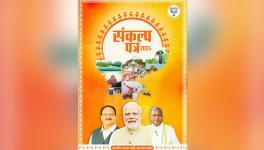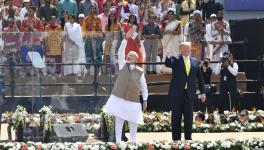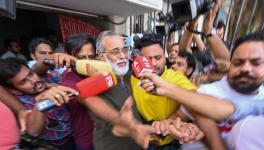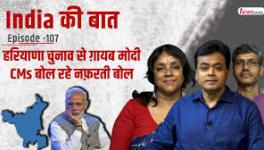Why Congress is Right to Skip Ayodhya Temple Inauguration
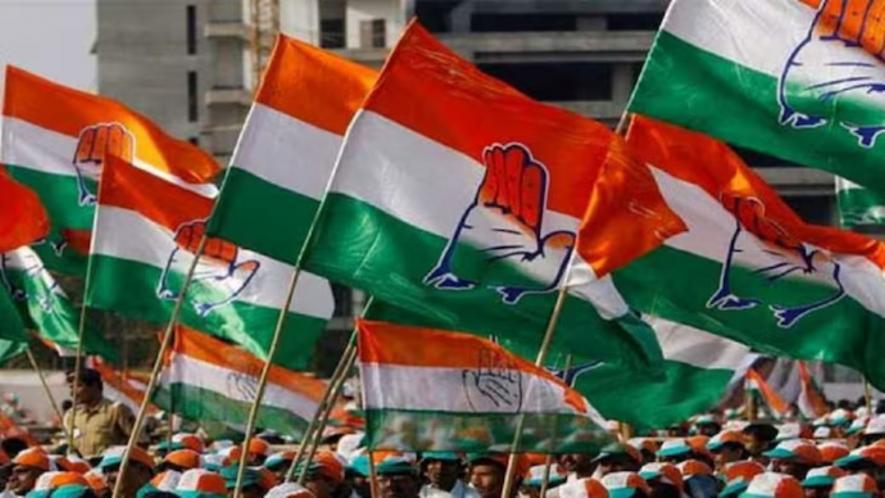
Representational Image. Image Courtesy: PTI
On 22 January, the imaginary slavery of the Hindus is coming to a glorious end. So say the Rashtriya Swayamsevak Sangh (RSS), Bharatiya Janata Party (BJP) and their chief campaigner, Prime Minister Narendra Modi. Hindu slavery, according to them, lasted for over 1,200 years. They have seen the rule of Muslim kings and warlords as the ‘rule of Muslims’ over the large majority of Hindus. This abuse of history is similar to the views held by Mohammad Ali Jinnah. For him, Pakistan came into existence when the first person converted to Islam in South Asia.
The grand opening of the Rama temple in Ayodhya will far surpass the celebrations of 15 August in both the money spent and the euphoria. The RSS and its political arm, the BJP, are leaving no stone unturned in whipping up the latter. They are also pulling no punches in condemning the failure of successive secular governments since 1947 to stand for the Hindus.
It is precisely to shame the leaders of other secular parties that the RSS and BJP decided to send letters of invitation to the heads of almost all major parties in India. The duumvirate knows that in times of religious euphoria, no party would have the galls to skip the grand inauguration and be subsequently labelled as Hinduphobic or anti-Hindu. The psychological price that the RSS-BJP coveted was to see its secular opponents line up and stand witness, sulking their heads, to the slaughter of Indian secularism.
The leaders of the Indian National Congress, Sonia Gandhi and Mallikarjun Kharge, were invited to the event. I strongly endorse their decision to give the event a miss.
All historians, biographers, and admirers of Mahatma Gandhi and Jawaharlal Nehru, two leaders who defined the spirit of the Congress, would agree that they would have refused to participate in such an event and denounced it in the harshest terms.
Both Gandhi, a devout Hindu and worshipper of Rama, and Jawaharlal Nehru, a modernist patriot, had secularism at the heart of their politics. They abhorred the political use of religion, especially when it tramples the right of existence of other faiths. The India that emerged on 15 August 1947 was a lacerated one. Communalism and inter-religious bigotry had torn apart millions of lives. In that period, Gandhi was not found celebrating India’s independence. He was in Bengal, camping amidst the masses and calming the riot-hit areas. Nehru made sure that India, constitutionally, does not ape Islamic Pakistan and becomes an unsafe place for all religious minorities.
On many occasions, Nehru was caught between a choice of convenience and secular steadfastness. In November 1947, Sardar Patel announced that the Somnath temple in Junagadh, Gujarat, would be rebuilt. Nehru knew that in the Hindu nationalist mythologies, Somnath was an emotive symbol for it had been destroyed by ‘Muslim invaders’ almost a thousand years before. He also understood that the state’s support in rebuilding a temple whose history was directly connected with anti-Muslim sentiment was unwise. In April 1951, President Rajendra Prasad inaugurated the Somnath temple against Nehru’s advice. Nehru, however, kept aloof from the inauguration. He could have acted like a pragmatist, nay opportunist politician, to go to Junagadh, which had just seen the fall and escape of the Muslim monarch to Pakistan and endeared himself to the Hindu masses. He did not. When Sardar Patel called for the reconstruction of the Somnath temple, Gandhi advised him against the government funding the project and suggested collecting money from the people.
The Rama temple inauguration is happening at the site of the forcefully razed Babri masjid and leaves behind a trail of communal riots. This would have angered even Patel. He had once forcefully declared, ‘‘If, in spite of having achieved independence, Gandhiji has to fast today in order to achieve real Hindu-Muslim unity, it is a standing shame for us. We have just heard people shouting that Muslims should be removed from India—those who do so have gone mad with anger. I say bitter things to both Hindus and Muslims alike. I am a frank man. At the same time, I maintain that I am a friend of Muslims.’’
Nowhere did Patel speak about the destruction of Babri mosque or, for that matter, any other mosque to be destroyed to make way for a Hindu temple. Even Gandhi visited a site of Rama’s fabled birthplace on 10 February 1921 and did not take any cognizance of the so-called Ramjanmabhoomi-Babri masjid issue. He was busy moulding the Khilafat movement. Gandhi declared at the time, ‘‘I do not want to say too much. I see students of Sanskrit here. I urge them to sacrifice their lives for Muslim brothers.’’ Since the pygmies of the RSS-BJP have done nothing for Indian independence and have no heroes of their own, they have built a huge statue of Patel, which they hide behind to wage a war of attrition on Indian secularism. In this, they have succeeded. And it is to make this very pie of success savoury that they seek the attendance of Congress leadership.
It might seem that Congress was caught in a difficult situation, almost between the Scylla of angering Hindus and the Charybdis of Hindutva. This is not the case. India was not built in the name of religion. A vast majority of Indians understood it for decades. After Gandhi’s assassination, men in black caps and brown shorts were an abhorrent sight. They crept their way to power stealthily. In the last Lok Sabha elections, they commanded 38% of the vote share, while 62% of voters did not side with them. Joining the festival on 22 January would have been a betrayal of those Indians. Attending the event would have meant that there is no counter-narrative or alternative vision of a secular and pluralistic India that could be presented to those among the 38% who have taken the communal bait.
Hitler defined the domestic meaning of politics in Germany singularly as hatred for Jews and all elements ‘un-German’ (broadly defined).
The forces of history have opened a new avenue for the Congress. By skipping the event, it has given a strong message to the Dalits, tribals, religious minorities, backward classes, and everyone else that it is committed to their welfare. Not attending the event will go a long way in correcting the historical wrong of former prime minister, late Rajiv Gandhi, having the locks of the disputed temple re-opened.
In the face of hungry bellies, temples and mosques count for nothing. This message should adorn the façade of the ‘Mohabbat ki Dukaan.’
The author is a PhD candidate at the Department of Political Science, University of Connecticut. He is the author of the collection of essays Against the Current, published by Hyphen in 2023.
Get the latest reports & analysis with people's perspective on Protests, movements & deep analytical videos, discussions of the current affairs in your Telegram app. Subscribe to NewsClick's Telegram channel & get Real-Time updates on stories, as they get published on our website.













